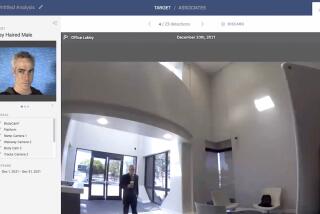Airliner Scare Boosts Security Firm Stocks
- Share via
Two California companies that make systems to detect weapons saw their shares surge Monday after the arrest of a passenger who allegedly tried to blow up a plane on a transatlantic flight Saturday.
InVision Technologies Inc., based in Newark, Calif., makes machines that scan baggage for the presence of explosives. Its shares rose $4.20, or 15%, to $32.71 on Nasdaq as investors bet sales will increase. The stock has soared tenfold since Sept. 11.
OSI Systems Inc., based in Hawthorne, makes a body-scan system that it says can detect plastic or ceramic weapons and explosives carried by a passenger. Its shares gained $1.70, or 12%, to $16.20, also on Nasdaq.
Until the Sept. 11 attacks, both stocks had hovered below the radar of investors. InVision shares soared from $3.11 on Sept. 10 to a recent peak of $45.50 on Dec. 14. OSI shares, $4.07 on Sept. 10, reached $21.90 on Dec. 7, then pulled back as low as $14.50 last week.
The two companies stand to gain from a new law requiring U.S. airports to scan all checked bags for explosives by the end of 2002. Congress approved $97.5 million for such purchases next year, although the Federal Aviation Administration has said it will cost $4 billion to $5 billion to buy enough detectors. The suspect in Saturday’s incident had no checked baggage.
“What everybody wants to see is how much money the FAA is going to spend,” said Dale Benson of Benson Associates in Portland, Ore., an OSI shareholder. “There’s a lot of business out there, and it could go on for a lot of years.”
The FAA ordered several InVision baggage scanners for $16.3 million, the company said Dec. 12. InVision’s machines use a system similar to CAT scan imaging to determine the densities of objects. Airport agencies or airlines based in France, Sweden, Chile, Israel and Italy have bought units this year, the company said.
The InVision detectors used for checked baggage cost $700,000 to $1.5 million, spokeswoman Jordan Goldstein said.
InVision’s San Diego subsidiary, Quantum Magnetics, has developed separate technology to screen carry-on bags. Those machines read the frequency of high-grade military explosives much as magnetic resonance imaging machines do for medical patients, said Quantum President Lowell Burnett.
If a particular explosive is present, the machine emits a radio signal. The technology, known as quadrupole resonance, has been on the market for about two years, Burnett said. The machines, at about $100,000 each, have been sold to the FAA, Department of Defense and other government agencies, but Burnett declined to say which airports use them.
The company also has developed a hand-held wand that would detect explosives such as C4 in a shoe. That product is heading for field tests at select airports in the next two months, Burnett said.
The company, acquired by InVision in 1997, first began work on the quadrupole resonance technology in 1994, acquiring several years worth of research from the Naval Research Laboratory. It has since received about $24 million in FAA funding to develop the devices and has invested $7 million of its own, Burnett said.
Research on the wand has been ongoing for “well over a year, but we certainly didn’t anticipate events like this,” he said.
InVision has shipped more than 260 of the larger machines for checked baggage worldwide, accounting for 90% of installations, the company has said. Some 161 of the devices are installed in U.S. airports, and another 2,200 are planned for use by the end of next year, the FAA has said.
The firm’s third-quarter revenue was $16.4 million, below its peak of $22 million for the same period last year. Its earnings per share show slight profitability this year.
“The opportunity for greatness is fantastic, and the opportunity for colossal failure is fantastic” with InVision shares, said John Buckingham, president of Al Frank Asset Management Inc. of Laguna Beach. The Al Frank Fund owns 15,000 shares and has sold 45,000 since Sept. 11, he said. InVision is the fund’s biggest holding.
InVision and New York-based L-3 Communications Holdings Inc. are the only companies with U.S. government certification to supply bomb-detection scanners to airports. Some analysts wonder whether InVision can boost production profitably to meet increased demand and whether it can compete against rivals that are expected to emerge, Buckingham said.
OSI said Oct. 29 that the FAA was buying five body-scanning systems from its Rapiscan Security Products unit.
OSI posted $26.5 million in revenue in the quarter ended Sept. 30, a slight increase over the same period the previous year. It also has shown consistent--yet slight--profitability in recent years.
Reports from Bloomberg News and Times staff writer Lee Romney were used in compiling this report.
More to Read
Inside the business of entertainment
The Wide Shot brings you news, analysis and insights on everything from streaming wars to production — and what it all means for the future.
You may occasionally receive promotional content from the Los Angeles Times.










